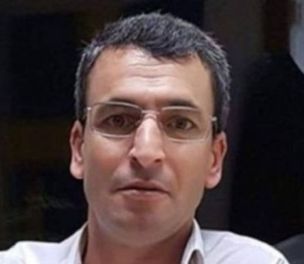Photo: AA
Finland's Defense Minister Antti Kaikkonen yesterday (December 8) visited his counterpart in Ankara, Hulusi Akar, to discuss the progress in his country's NATO membership bid and related issues.
The two main issues that stood out were the fight against terrorism and the restrictions on Finland's arms sales to Türkiye, Akar said at a joint press conference following a one-on-one meeting and a meeting between delegations.
Referring to a June memorandum signed between Türkiye, Finland and Sweden, Akar said, "We have expressed to them that we expect concrete developments regarding these commitments. In this framework, we are sad to witness that some activities of the PKK/YPG terror group still continue in Finland."
Akar added that he emphasized the importance of stopping these activities and the extradition of "known terrorists."
"We are not against NATO's open-door policy in any way. We support this in terms of Finland as well. But we expect the commitments in the memorandum signed in Madrid to be fulfilled," he further said.
For his part, Kaikkonen said Türkiye has his country's full support in the fight against terrorism and Finland was considering lifting restrictions on arms sales to Ankara.
"As stated in the trilateral memorandum clearly, there is no international arms embargo whatsoever. We will continue this process taking into account that we will all be allies within NATO," he remarked.
Speaking to Türkiye's state-run Anadolu Agency (AA) after the meeting, Kaikkonen said, "We really understand the security concerns Türkiye has, and Türkiye can count on that Finland is committed to working against terrorism. No doubt about that."
The meeting, which was the first in-person meeting of the two countries' defense ministers, was "constructive and in a good spirit," he said.
What happened?
Finland and Sweden formally applied to join NATO on May 18, in a decision spurred by Russia's war on Ukraine.
However, Türkiye, a NATO member for over 70 years, voiced objections to the membership bids, criticizing the two countries for tolerating and even supporting "terrorist groups."
The three countries signed a trilateral memorandum of understanding on June 28 at the NATO summit in Madrid, which stipulates that Finland and Sweden will not provide support to the Democratic Union Party (PYD) and the People's Defense Units (YPG), which Türkiye sees as the PKK's extensions in Syria.
The Nordic countries also agreed to address Ankara's pending deportation or extradition requests regarding "terror" suspects.
Türkiye's parliament must ratify the country's approval for Finland and Sweden's membership for them to join NATO.
In September, Sweden lifted restrictions on arms sales to Türkiye, which was among Ankara's demands in order to approve its NATO bid.
The trilateral memorandum1-Today the representatives of Turkiye, Finland and Sweden, under the auspices of the NATO Secretary General, have agreed the following. 2-NATO is an Alliance based on the principles of collective defence and the indivisibility of security, as well as on common values. Turkiye, Finland and Sweden affirm their adherence to the principles and values enshrined in the Washington Treaty. 3-One of the key elements of the Alliance is unwavering solidarity and cooperation in the fight against terrorism, in all its forms and manifestations, which constitutes a direct threat to the national security of Allies as well as to international peace and security. 4-As prospective NATO Allies, Finland and Sweden extend their full support to Turkiye against threats to its national security. To that effect, Finland and Sweden will not provide support to YPG/PYD, and the organisation described as FETO in Turkiye. Turkiye also extends its full support to Finland and Sweden against threats to their national security. Finland and Sweden reject and condemn terrorism in all its forms and manifestations, in the strongest terms. Finland and Sweden unambiguously condemn all terrorist organisations perpetrating attacks against Turkiye, and express their deepest solidarity with Turkiye and the families of the victims. 5-Finland and Sweden confirm that the PKK is a proscribed terrorist organisation. Finland and Sweden commit to prevent activities of the PKK and all other terrorist organisations and their extensions, as well as activities by individuals in affiliated and inspired groups or networks linked to these terrorist organisations. Turkiye, Finland and Sweden have agreed to step up cooperation to prevent the activities of these terrorist groups. Finland and Sweden reject the goals of these terrorist organisations. 6-Further to this, Finland refers to several recent amendments of its Criminal Code by which new acts have been enacted as punishable terrorist crimes. The latest amendments entered into force on 1 January 2022, by which the scope of participation in the activity of a terrorist group has been widened. At the same time, public incitement related to terrorist offenses was criminalised as a separate offense. Sweden confirms that a new, tougher, Terrorist Offenses Act enters into force on 1 July, and that the government is preparing further tightening of counter-terrorism legislation. 7-Turkiye, Finland and Sweden confirm that now there are no national arms embargoes in place between them. Sweden is changing its national regulatory framework for arms exports in relation to NATO Allies. In future, defence exports from Finland and Sweden will be conducted in line with Alliance solidarity and in accordance with the letter and spirit of article 3 of the Washington Treaty. 8-Today, Turkiye, Finland and Sweden commit to the following concrete steps: Establish a joint, structured dialogue and cooperation mechanism at all levels of government, including between law enforcement and intelligence agencies, to enhance cooperation on counter-terrorism, organised crime, and other common challenges as they so decide. Finland and Sweden will conduct the fight against terrorism with determination, resolve, and in accordance with the provisions of the relevant NATO documents and policies, and will take all required steps to tighten further domestic legislation to this end. Finland and Sweden will address Turkiye's pending deportation or extradition requests of terror suspects expeditiously and thoroughly, taking into account information, evidence and intelligence provided by Turkiye, and establish necessary bilateral legal frameworks to facilitate extradition and security cooperation with Turkiye, in accordance with the European Convention on Extradition. Finland and Sweden will investigate and interdict any financing and recruitment activities of the PKK and all other terrorist organisations and their extensions, as well affiliates or inspired groups or networks as outlined in paragraph 5. Turkiye, Finland and Sweden commit to fight disinformation, and prevent their domestic laws from being abused for the benefit or promotion of terrorist organisations, including through activities that incite violence against Turkiye. Finland and Sweden will ensure that their respective national regulatory frameworks for arms exports enable new commitments to Allies and reflects their status as NATO members. Finland and Sweden commit to support the fullest possible involvement of Turkiye and other non-EU Allies in the existing and prospective initiatives of the European Union's Common Security and Defence Policy, including Turkiye's participation in the PESCO Project on Military Mobility. 9-For the implementation of these steps, Turkiye, Finland and Sweden will establish a Permanent Joint Mechanism, with the participation of experts from the Ministries of Foreign Affairs, Interior, and Justice, as well as Intelligence Services and Security Institutions. The Permanent Joint Mechanism will be open for others to join. 10-Turkiye confirms its long-standing support for NATO's Open Door policy, and agrees to support at the 2022 Madrid Summit the invitation of Finland and Sweden to become members of NATO. |
(VK)








